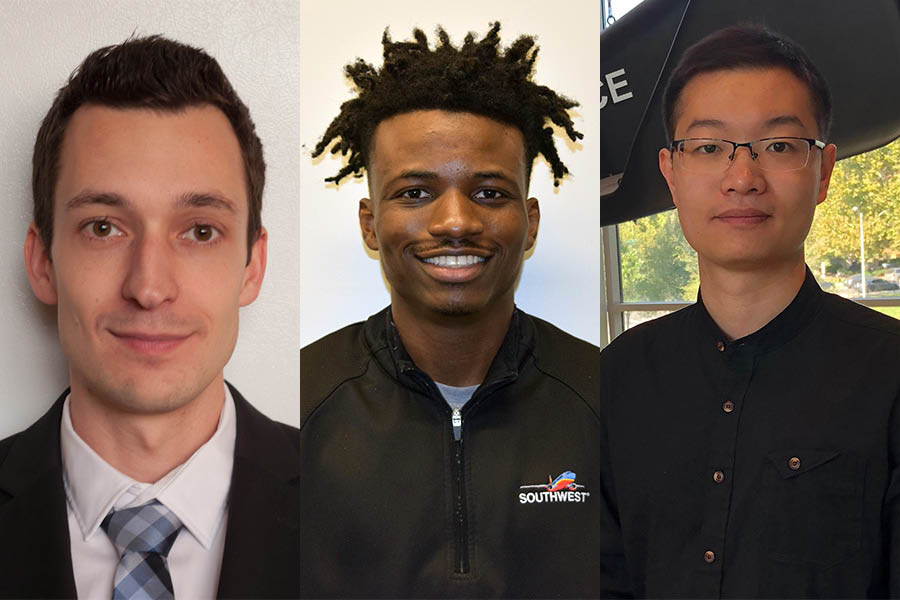Three AAE students selected for Bilsland Dissertation Fellowship

Three AAE Ph.D. students were selected to receive the Bilsland Dissertation Fellowship, which provides support for outstanding Ph.D. candidates in their final year of doctoral degree completion. The goal of the fellowship, awarded by the Dean of Purdue’s Graduate School, is to allow exceptional candidates to focus exclusively on finishing their dissertation.
Kolawole Ogunsina, Sylvain Renevey, and Xuan Wang each will receive a stipend for 2019-20 of $20,000 ($1,666.66 per month). The fellowship includes a graduate tuition scholarship, medical insurance supplement, and coverage of most fees.
Ogunsina’s primary research areas are in aerospace systems, under the advisement of Professors Daniel DeLaurentis and William Crossley. Specifically, Ogunsina is studying the synthesis of artificial intelligence and blockchain technology to achieve concurrent decision-making among intelligent systems for airline disruption management, and assessing the fleet-level impact of the reemergence commercial supersonic travel and operations on future environmental emissions.
The research on airline disruption management will enable airlines to recover lost revenue by mitigating the impact of uncertainties due to random disruption events — like inclement weather — on flight schedules, while improving passenger satisfaction and travel experience. The research on commercial supersonic travel will avail pertinent economic and environmental information like trip frequency and CO2 emissions on plausible routes for supersonic travel to policy makers as they develop necessary aviation emission reduction initiatives.
“The Bilsland fellowship is Godsend. I am thankful for the privilege to be a recipient,” Ogunsina says.
Renevey is a third-year Ph.D. student of David Spencer, an associate professor in AAE. Renevey’s research is focused on spacecraft formation flying, specifically on the development of a control algorithm based on relative orbital elements and artificial potential functions. Those two methodologies enable the intuitive design of geometrically complex formations and allow to handle collision avoidance in a computationally efficient manner. The on-board utilization of this algorithm provides the spacecraft with the ability to detect and prevent collisions, enabling safer formation establishment and proximity operations.
“I’m very happy and grateful to be chosen as a fellowship recipient,” Renevey says. “This fellowship will allow me to focus entirely on working on my research and writing my dissertation, and I would like to thank my advisor, Professor David Spencer, for his continuous support and valuable advice.”
Wang’s research topic is the distributed control of multi-agent network under Shaoshuai Mou, an assistant professor in AAE, in the area of Dynamics and Control. In large scale multi-agent networks, limitations on communication bandwidth and physical distance usually prohibit the existence of a centralized controller to coordinate all agents. In this situation, distributed control algorithms are developed, which allows all agents to reach a global goal through only local coordination.
“I have passed my preliminary exam in Fall 2018, so this is my last year before graduation. The Bilsland fellowship is a great encouragement to my Ph.D. study,” Wang says. “Furthermore, it allows me to put all my efforts to research and pursue higher-level academic achievements.”
